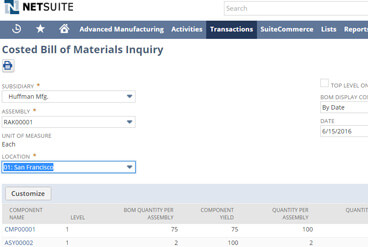Product Features
For Manufacturing
Home / Product Data Management
Menu
Product Data Management
Manage all your product data in one place, simplify the design process and reduce time to market for new products.
NetSuite is built from the ground up to support product-based businesses and has robust capabilities to establish and maintain all of the master data you need to run your business including: items, customers, partners and vendors. For any other data you want to track, the SuiteCloud platform can define an unlimited number of additional fields, tables and searches, etc. to provide visibility into any data you want, where you want it—regardless of the source.
Key Benefits
- Ensure production engineering changes propagate end-to-end and are reflected in downstream BOMs, plans and inventories.
- Extended capabilities for inventory control tracking, planning and costing of items in project-controlled environments.
- Deliver more flexibility in costing by supporting comprehensive inventory costing methods including LIFO, FIFO, average, standard and actual costing.
- Streamline team management using at-a-glance allocations of people with data, processes and business systems.
- Integrate with other CAD applications and simplify costing by supporting easy importation of BOMs.






























